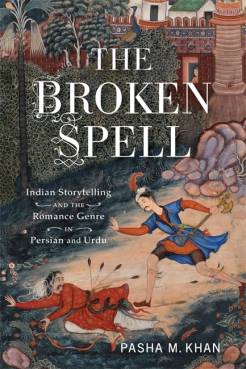Khan, Pasha M. 2019. The broken spell: Indian storytelling and the romance genre in Persian and Urdu (Series in Fairy-Tale Studies). Detroit: Wayne State University Press.

The Broken Spell: Indian Storytelling and the Romance Genre in Persian and Urdu is a monograph on the rise and fall in popularity of “romances” (qissah)—tales of wonder and magic told by storytellers at princely courts and in public spaces in India from the sixteenth century to the twentieth. Using literary genre theory, author Pasha M. Khan points to the worldviews underlying the popularity of Urdu and Persian romances, before pre-existing Islamicate rationalist traditions gained traction and Western colonialism came to prominence in India.
In the introduction, Khan explains that it was around the end of the nineteenth century that these marvelous tales became devalued by Orientalists and intellectually colonized Indian elites, while at the same time a new genre, the novel, gained legitimacy. Khan goes on to narrate the life histories of professional storytellers, many of them émigrés from Iran to Mughal-ruled India, and considers how they raised their own worth and that of the romance in the face of changes in the economics, culture, and patronage of India. Khan shows the methods whereby such storytellers performed and how they promoted themselves and their art. The dividing line between marvelous tales and history is examined, showing how and why the boundary was porous. The study historicizes the Western understanding of the qissah as a local manifestation of a worldwide romance genre, showing that this genre equation had profound ideological effects. The book’s appendix contains a translation of an important text for understanding Iranian and Indian storytelling methods: the unpublished introductory portions to Fakhr al-Zamani’s manual for storytellers.